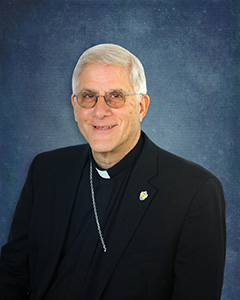By Bishop Joseph R. Kopacz, D.D.
Our God of perseverance and encouragement continues to pour out abundant grace during this Jubilee Year of Hope in creative ways. This year’s theme for Catechetical Sunday is “Always be ready to give an explanation … for a reason for your hope,” taken from 1 Peter 3:15. Pilgrims of hope are summoned to do so because the light of Christ that burns within us is intended for the world as well as for the believer who walks by faith.
This verse is from the first of two letters of St. Peter and is wisdom that is ever ancient and ever new. The full verse is one of the New Testament’s finest gems: “But in your hearts revere Christ as Lord. Always be prepared to give an answer to anyone who asks you to give the reason for the hope that you have. But do this with gentleness and respect.”

Numerically, 1 Peter 3:15 easily calls to mind John 3:16: “God so loved the world that he gave his only Son, that whoever believes in him shall not perish but have eternal life.” To believe that God so loved the world positions the person of faith to be ready to share the hope that lives within.
As an aside, John and Peter were the first apostles, following the lead of Mary Magdalene, to run to the empty tomb — a foretaste of the hope that was on the horizon for them and for the world.
Therefore, our parish and Catholic school catechists — teachers of religion — have a unique ministry. They not only teach the Catholic faith from Sacred Scripture and tradition but are also empowered to witness to the reason for the hope that is within them.
It is a demanding ministry that requires the gifts and fruits of the Holy Spirit, and the motivation for ongoing formation in wisdom, knowledge and grace in order to teach the next generation. Asking God’s blessing upon them on our annual Catechetical Sunday harmonizes this honorable ministry with the Eucharist, the source and summit of our faith.
The treasures of our faith are inexhaustible, and many in each generation have labored to organize the story of salvation in a comprehensive, systematic and balanced way. The most wide-reaching compact assertion of our faith is the Nicene Creed. At 1,700 years young, and as the centerpiece of our tradition, it is certain to be proclaimed until Christ comes again. As we move through the verses of the Creed at each Mass, in reality we are professing the reason for the hope that lives within.
Gentleness and respect are underscored by St. Peter as the essential dispositions when sharing and teaching the faith. These run counter to the climate of meanness and disrespect that overwhelm so much discourse today in society and the church, and therefore are all the more indispensable in the classrooms of our parishes and schools. They are signs of love. And faith and hope without love, the greatest of the three theological virtues, produce a clanging cymbal — an apt way of visualizing contemporary discourse.
On the other hand, the first scripture reading from the prophet Amos on Catechetical Sunday brings full circle how the love of Christ within impels us to live justly and compassionately outwardly. Amos, Isaiah and Micah come to mind as prophets of social justice, who, like John the Baptist, prepared the way for the Lord in whom they find their fulfillment.
Amos did not mince words in last week’s proclamation: “Hear this, you who trample upon the needy and destroy the poor of the land … Never will I forget a thing they have done.” Where do God’s words through the prophet cry out today?
Recently, on the diocesan level, we hosted a prayer service at the cathedral on behalf of immigrants, refugees and dreamers — to be in prayerful solidarity, raise awareness and inspire more just and compassionate attitudes and actions in our country. Amos can find a niche here, and the prophet Micah further shapes our words and actions: “God has shown you, O man, what is good. And what does the Lord require of you but to do justly, and to love mercy, and to walk humbly with your God?” (Micah 6:8).
All who are baptized in the Lord are called to be pilgrims of hope. May this Jubilee Year, and all commemorations and gatherings, be a time of renewal and a year of favor from the Lord.
